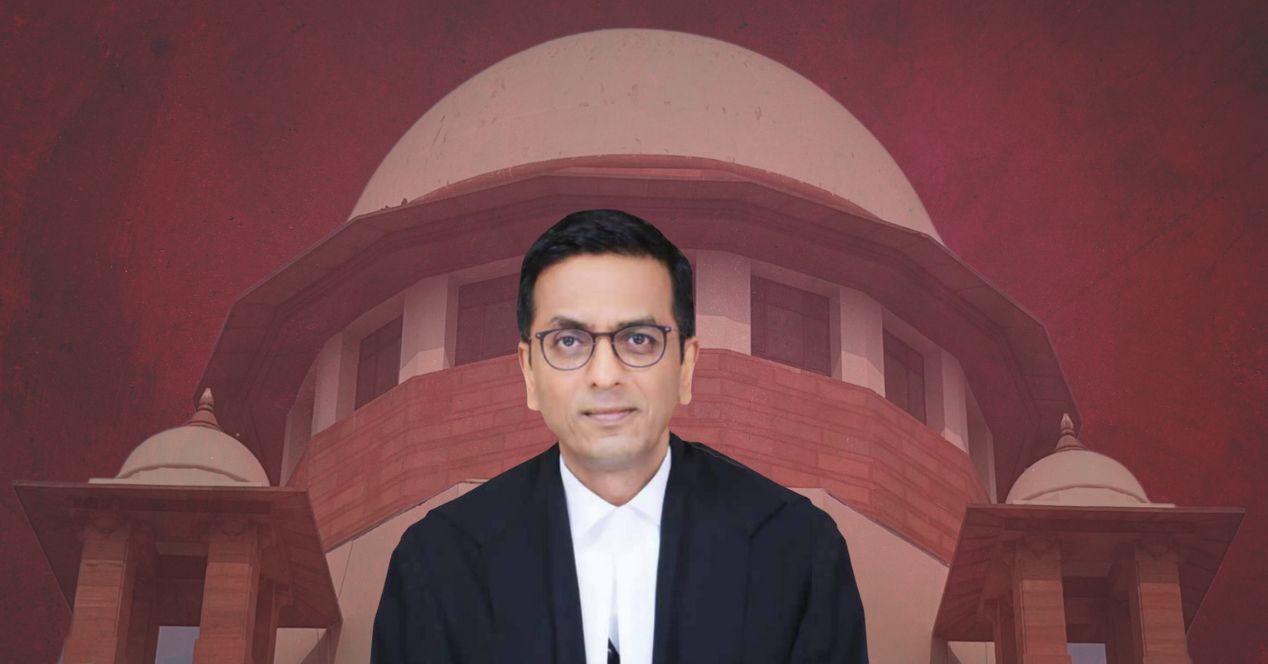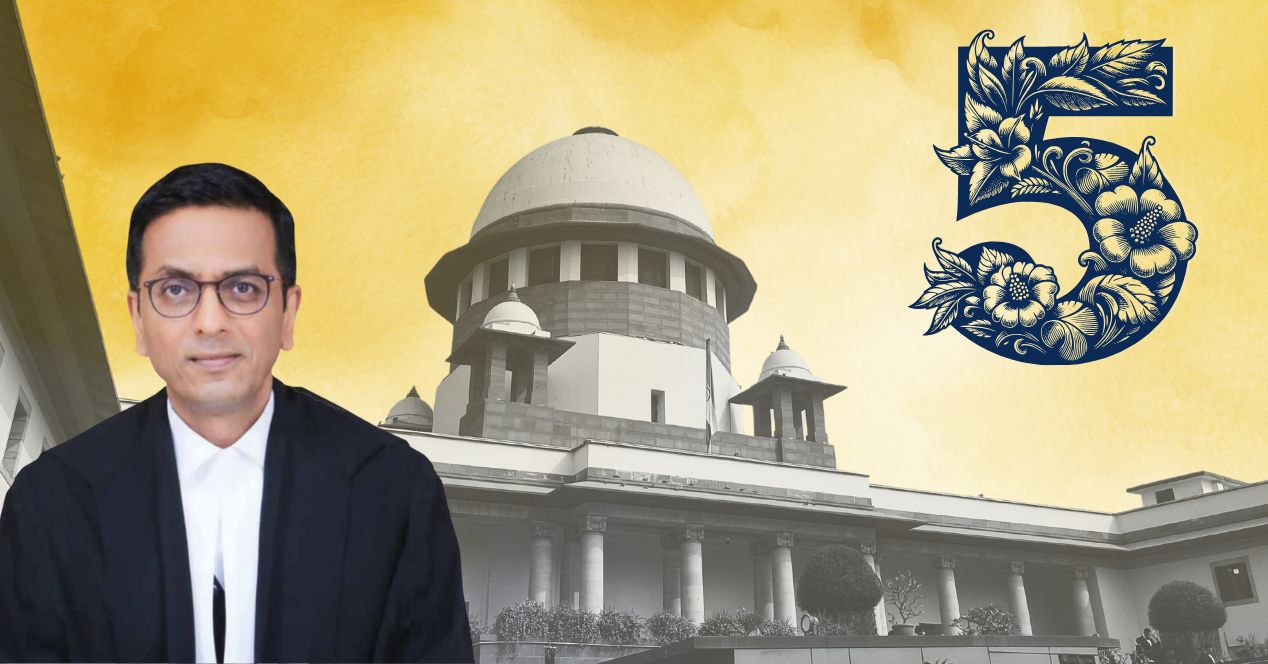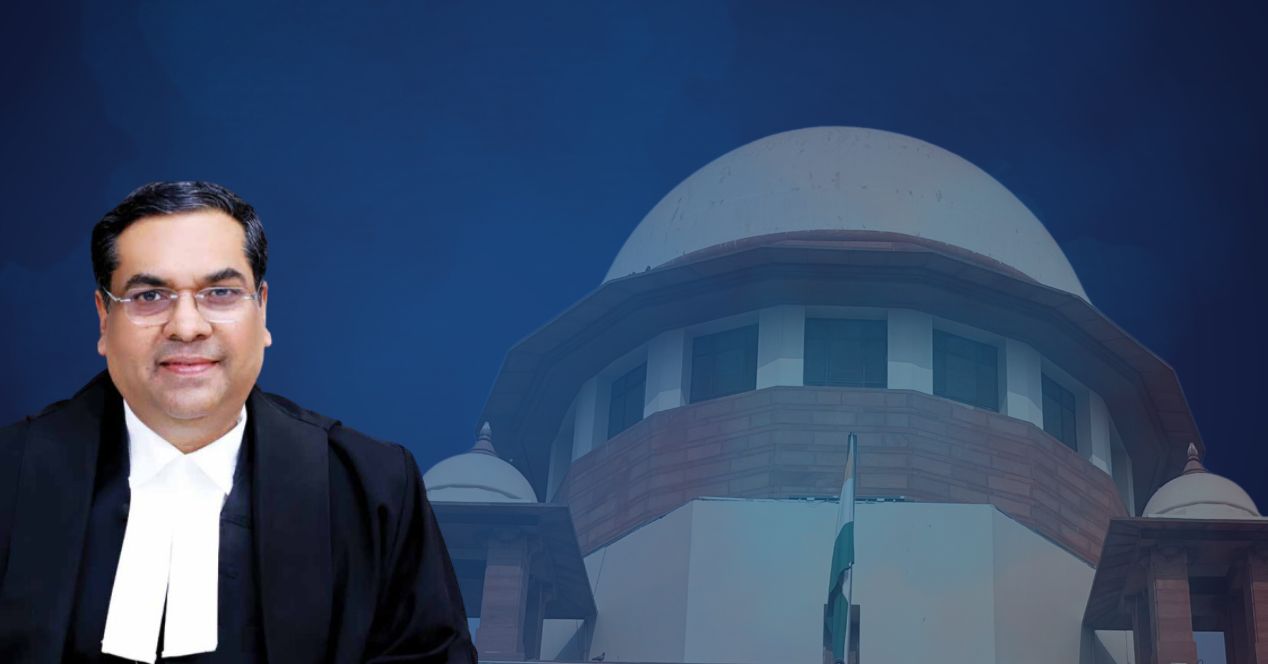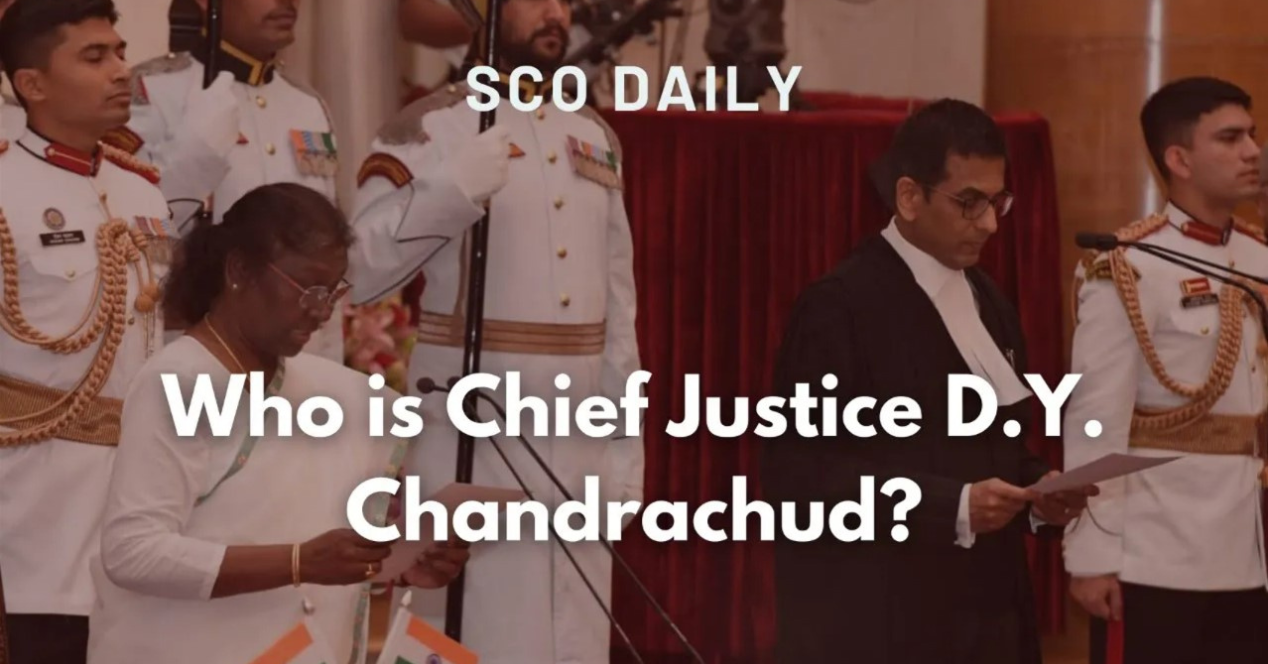Analysis
The top 10 judgements of Chief Justice D.Y. Chandrachud
A subjective list of 10 (plus five bonus mentions) of the outgoing Chief Justice of India’s most important judgements in the Supreme Court
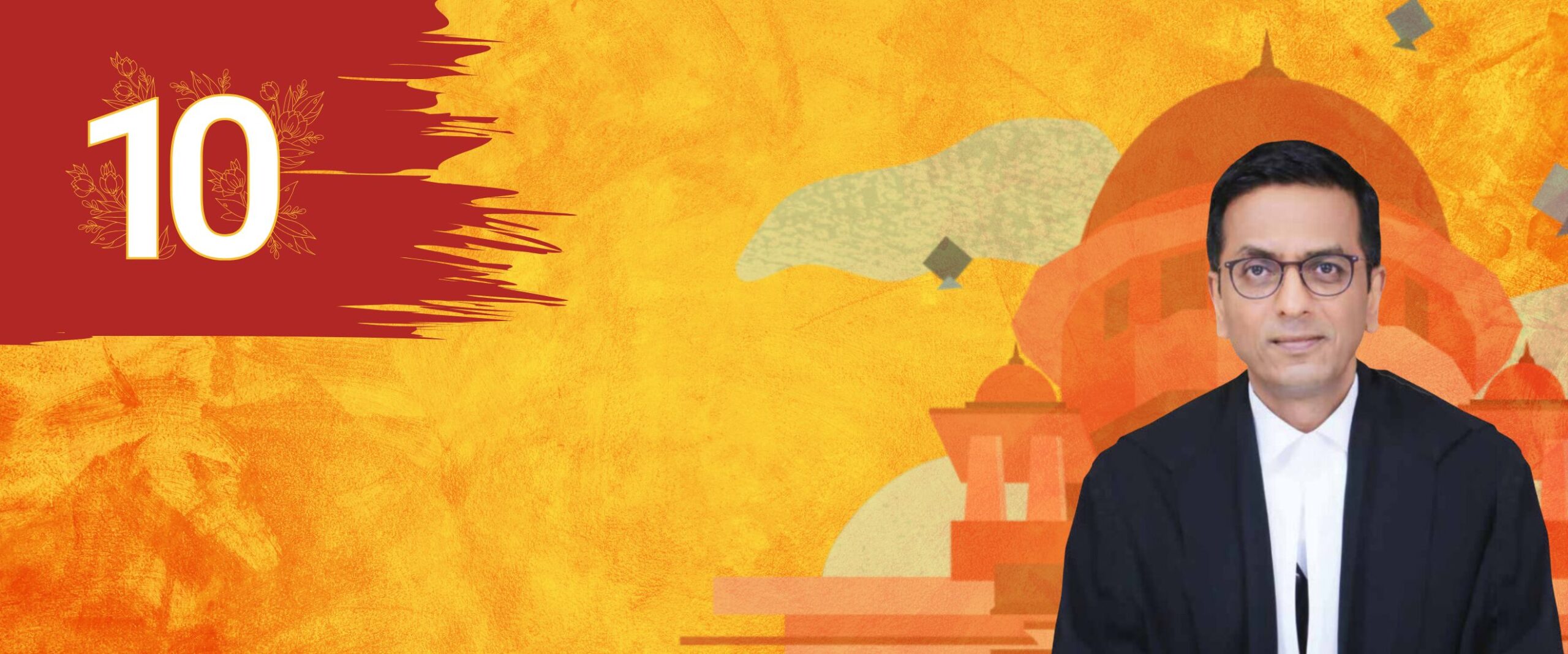
Today is Chief Justice D.Y. Chandrachud’s final day at the Supreme Court. He was elevated to the top court in 2016 and became the Chief Justice in November 2022. His long tenure has been marked by pivotal judgements on a wide array of subjects.
His judgements have touched upon matters of privacy, bodily autonomy, federalism, affirmative action and even arbitration. He has been a part of 1275 benches. He authored 613 judgements during his tenure, out of which at least 500 were as a puisne judge.
Admittedly, picking the top ten decisions is no easy task. In this listicle, we’ve tried to capture judgements that have moved the needle of jurisprudence and left a dent in public life and its interaction with polity and personal rights.
1) Fundamental right to privacy | Nine-judge bench
Justice K.S. Puttaswamy v Union of India
On 24 August 2017, a nine-judge bench of the Supreme Court unanimously recognised privacy as a fundamental right, integral to an individual’s dignity and autonomy.
This case stemmed from a 2012 petition by retired judge K.S. Puttaswamy, who had challenged the constitutional validity of the Aadhaar Act, which legitimised India’s Unique Identity Number programme. Authoring the majority opinion on behalf of the bench, Justice Chandrachud held that privacy was an “intrinsic part of the right to life and personal liberty under Article 21, and part of the freedoms guaranteed under Part III of the Constitution.” The Court relied on this decision to arrive at its landmark decisions to decriminalise adultery and homosexuality.
2) Decriminalising homosexuality | Five-judge bench
Navtej Singh Johar v Union of India
On 6 September 2018, a unanimous five-judge bench partially struck down Section 377 of the Indian Penal Code, 1860, a provision which decriminalised same-sex relations between consenting adults. The Court noted that the wording relating to bestiality within Section 377 would continue to remain in effect.
In his concurring opinion, which was longer than all other opinions in the decision, Justice Chandrachud observed that Section 377 had pushed a class of citizens to the margins. Drawing on his previous judgement in Puttaswamy, which recognised the fundamental right to privacy, he noted that non-recognition of the right to sexual orientation was a denial of privacy. He stated that human sexuality could not be “reduced to a binary formulation” nor could it be“defined narrowly in terms of its function as a means to procreation.”
3) Decriminalisation of adultery | Five-judge bench
Joseph Shine v Union of India
On 27 September 2018, a five-judge bench led by then Chief Justice Dipak Misra unanimously decriminalised adultery under Section 497 of the Indian Penal Code,1860. The provision imposed culpability on a man who engaged in sexual intercourse with another man’s wife. The bench reasoned that the provision violated Articles 14, 15 and 21 of the Constitution. The section, they declared, was archaic and paternalistic and infringed on a woman’s autonomy and dignity.
While the majority opinion was penned by Justice Misra, in a separate concurring opinion, Justice Chandrachud wrote that “the law on adultery is but a codified rule of patriarchy” and it perpetrated the regressive idea of women’s “subordinate role in marriage.”
4) Sabarimala temple entry | Five-judge bench
Indian Young Lawyers’ Association v State of Kerala
On 28 September 2018, a 4:1 majority held that denying women of menstruating age entry into the Sabarimala temple was unconstitutional. Such practice, the bench held, violated women’s fundamental rights to freedom of religion, equality and liberty.
Justice Chandrachud’s concurring opinion noted that prohibiting the entry of women into the temple was not an “essential religious practice” and that Lord Ayyappa’s devotees did not constitute a “religious denomination” under Article 26. However, the concurring opinion also seemed to challenge the majority’s reliance on the ERP doctrine. According to Justice Chandrachud, the Court setting itself up as an arbiter of which practices were essential was “problematic”; he seemed to prefer testing a religious practice solely against fundamental rights.
In dissent, Justice Indu Malhotra stated that religious groups had the liberty to decide their essential practices and that courts should refrain from intervening in religious practices unless they are inherently oppressive. A review petition against this decision in the case remains pending before a nine-judge bench.
5) Ayodhya title dispute | Five-judge bench
M Siddiq v Mahant Suresh Das
On 9 November 2019, a five-judge bench consisting of Justice Chandrachud unanimously awarded the disputed Ayodhya title to the deity, Shri Ram Virajman and directed the Uttar Pradesh government to grant the Sunni Waqf Board an alternate site in Ayodhya for the construction of a mosque.
The judgement, written in 1045 pages, was per curiam, meaning that it was written on behalf of the Court as a whole, and the author of the judgement remained anonymous. The Court overturned the 2010 decision of the Allahabad High Court which had divided the title equally among the Nirmohi Akhara, U.P. Sunni Central Board of Waqfs and Shri Ram Virajman. The decision acknowledged that the felling of the Babri masjid on 6 December 1992 by kar sevaks was a “serious violation of law”.
It also noted, based on the findings of a report by the Archaeological Survey of India, that there was no evidence to suggest that the underlying structure was a temple dedicated to Lord Ram. However, the Court noted, “the evidence in respect of the possessory claim of the Hindus to the composite whole of the disputed property stands on a better footing than the evidence adduced by the Muslims.” A couple of weeks before his retirement, during a programme in his native village Kanhesar, Chief Justice Chandrachud stated that he had prayed to god for a solution to the Ayodhya dispute.
6) Administration of the National Capital Region | Five-judge bench
Government of NCT of Delhi v Union of India (I), Government of NCT of Delhi v Union of India (II)
On 4 July 2018, a five-judge bench unanimously held that the Chief Minister and not the Lieutenant Governor (LG) of Delhi was the executive head of the Delhi government. The bench was interpreting Article 239AA of the Constitution which deals with special provisions for Delhi.
CJI Dipak Misra authored the majority opinion, with two concurring opinions by Justices Chandrachud and Ashok Bhushan. Justice Chandrachud observed that Article 239AA mandated a legislative assembly and a Council of Ministers. He explained that the executive power of the Delhi government is co-extensive with the legislative power and that the LG is bound by the aid and advice of the Council of Ministers on matters where the Delhi Government has the power to make laws. If the LG acts independently, he observed, it violates the principle of “representative government”.
Five years later, CJI Chandrachud authored another decision over the control of services in Delhi. The bench held that the legislative assembly had complete control over civil services in Delhi and could legislate on all matters in the State List except public order, police and land—subjects expressly excluded by Article 239AA. The opinion observed that Article 239AA was incorporated in the “spirit of federalism” so that residents had the right to choose who would govern them.
7) Plea for marriage equality | Five-judge bench
Supriyo @ Supriya Chakraborty v Union of India
On 17 October 2023, a five-judge bench of the Supreme Court unanimously held that there is no fundamental right to marry for sexual minorities. The bench, however, unanimously declared that transgender or intersex persons in heterosexual relationships can marry. The bench, led by CJI Chandrachud, also held that the Special Marriage Act (SMA), 1954 is not discriminatory for excluding non-heterosexual couples.
In his opinion, CJI Chandrachud cautioned that declaring the SMA unconstitutional could set India back to the pre-independence period when inter-caste and inter-faith marriages did not have legislative sanction. He stated that addressing one form of discrimination cannot entail introducing another.
Notably, CJI Chandrachud was in the minority in holding that non-heterosexual couples have the right to form “civil unions” under Article 19 describing these as “intimate associations” rooted in the expression of gender identity and sexual orientation. The majority led by Justice S.R. Bhat disagreed, holding that civil unions could only be established through legislative action. CJI Chandrachud’s partial dissent also extended to batting in favour of adoption rights for non-heterosexual couples.
8) Challenge to abrogation of Article 370 | Five-judge bench
In Re: Article 370 of the Constitution
On 11 December 2023, the Supreme Court upheld the Union government’s abrogation of Article 370, which granted special status to Jammu and Kashmir (J&K). CJI Chandrachud wrote the majority opinion, with concurring opinions by Justices S.K. Kaul and Sanjiv Khanna. All judges agreed that Article 370 was a temporary provision, designed to accommodate the immediate needs of the erstwhile state.
CJI Chandrachud held that J&K was always an integral part of India and that the special status it enjoyed was simply a type of asymmetric federalism—not an indication that it enjoyed a separate sovereignty. The Bench also gave a wide reading of the President’s Rule under Article 356, stating that the President has unilateral power under Article 370(3) to abrogate Article 370 (since the J&K Constituent Assembly stood dissolved in 1957).
The Court refused to comment on the constitutionality of the reorganisation of J&K state into two Union Territories: Jammu and Kashmir and Ladakh, and satisfied itself with an assurance from the Union that assembly elections would be held before 30 September 2024.
9) Constitutionality of the Electoral Bonds Scheme | Five-judge bench
Association for Democratic Reforms v Union of India
In a major case on political funding that preceded the 2024 Lok Sabha Election, a five-judge Constitution Bench led by CJI Chandrachud unanimously struck down the 2018 Electoral Bond Scheme. The Bench held that the Scheme violated voters’ right to information enshrined in Article 19(1)(a) of the Constitution. They held that “information about funding to a political party is essential for a voter to exercise their freedom to vote in an effective manner.”
The judgement, authored by CJI Chandrachud, stated that “the Scheme is not fool-proof. There are sufficient gaps in the Scheme which enable political parties to know the particulars of the contributions made to them.”
In three subsequent hearings, after the decision was pronounced, the Court ordered the immediate end to all sales of Electoral Bonds and ordered the State Bank of India (SBI) to publish all data on Electoral Bond transactions.
10) Sub-classification within SC/ST categories | Seven-judge bench
State of Punjab v Davinder Singh
On 1 August 2024, a seven-judge bench of the Supreme Court led by CJI Chandrachud delivered a decision crucial to the affirmative action discourse in the country. In a 6:1 majority, the bench held that state governments had the power to create sub-classifications within the reserved Scheduled Caste and Schedule Tribe categories for reservations.
The majority, led by the Chief, held that the different entries in the SC/ST list in the Constitution faced varying degrees of discrimination and inequality. Therefore, sub-classifications were permissible to combat the battle of “backwardness within backwardness”. The bench however held that any law creating sub-classification had to be based on empirical evidence and could be challenged in a court of law.
Honourable mentions
-
Arbitration jurisprudence under CJI Chandrachud
In the last two years, Constitution Benches led by CJI Chandrachud have passed significant decisions in arbitration matters. In December 2023, a seven-judge bench held that unstamped arbitration agreements were not void. The same month, a five-judge bench upheld the applicability of the Group of Companies doctrine in India. Simply put, the bench held that non-signatories can be made parties to an arbitration agreement. On 8 November, his last working day at the Court, a five-judge bench led by him held that arbitration clauses which allow unilateral appointments were invalid.
-
Private property and “material resources of the community”
On 5 November 2024, a nine-judge bench, in an 8:1 majority, held that not all privately owned property was a material resource of the community under Article 39(b). In his majority judgement, CJI Chandrachud noted that our Constitution promoted “economic democracy”, so holding that all private property could blatantly be considered a material resource would be contrary to this ideal.
The bench was also grappling with whether Article 31C, which saves laws enacted to give effect to Directive Principles of State Policy under Article 39(b) and (c) still exists in the Constitution. It unanimously answered in the affirmative.
-
Minority status of Aligarh Muslim University
CJI Chandrachud authored the majority opinion which laid down the conditions to determine a minority institution status under Article 30. The opinion overruled Azeez Basha v Union of India (1967), which held that a minority institution must be both “established and administered” by a religious or linguistic minority community. According to CJI Chandrachud, “establishment” is enough to determine minority status. The specific question of the minority status decision of AMU will be decided by a smaller bench on the back of this judgement.
-
Right against climate change
On 8 April 2024, a three-judge bench led by CJI Chandrachud noted that there exists “a right against the adverse effects of climate change”, which flowed from Articles 14 and 21. The judgement observed that climate change-related cases ”will travel to the [Indian] courts in the next few years.” Commentators suggested that the Court’s articulation of the unequal vulnerabilities of climate change, and its study of the global climate litigation landscape was “unprecedented and a welcome move.”
However, the judgement ruled in favour of the installation of overhead transmission lines through a habitat of the critically endangered Great Indian Bustard. It reasoned that renewable energy was a means to tackle climate inequality and overhead lines would not harm the farmers in the region.
-
MediaOne broadcast ban
On 5 April 2023, the Supreme Court quashed the Union’s broadcast ban against MediaOne TV. The judgement, authored by CJI Chandrachud, held that the Union could not use unsubstantiated “national security concerns” to violate press freedom and the freedom of speech.
The two-judge bench sharply criticised the Kerala High Court for upholding the ban and criticised sealed cover submissions about the “concerns”. They agreed with the petitioners’ argument that sealed cover submissions “rendered the rights of the petitioner as a dry parchment.”

